The Canadian Ombudsperson for Responsible Enterprise Annual Report 2019-2021:
Promote
Advise
Review
Recommend
Table of contents
- Message from the Ombudsperson
- 2019-2021 Year in review
- About our office
- Promote and advise
- Review
- Public reporting and recommendations
- Looking forward
- Expenditures
Hon. Mary Ng
Minister of Small Business,
Export Promotion and International Trade
Date: October 29, 2021 Dear Minister Ng,
Pursuant to paragraph 13 (1) of Order in Council P.C. 2019-1323 of September 6, 2019, that establishes the mandate of the Canadian Ombudsperson for Responsible Enterprise (CORE), it is an honour to submit the CORE's first Annual Report for the period of May 1, 2019 to March 31, 2021.
Yours sincerely,
Sheri Meyerhoffer
Canadian Ombudsperson for Responsible Enterprise
Message from the Ombudsperson
First in the world

We are the first Ombud office of its kind in the world, providing a significant opportunity to reshape how Canadian companies support and uphold respect for human rights. I was appointed as the Canadian Ombudsperson for Responsible Enterprise (CORE) in 2019, a year after the government announced the idea of the CORE.
Since then, I have established and staffed my office. The first year of operations we were busy laying the foundation. We began our work from a blank slate, and we knew we had to take the time to get it right. Two years later, we're proud of what we have accomplished.
As a first step, we initiated public consultations to build relationships and gain valuable insight into how our office can define and execute the mandate given to me by the Order in Council (OiC). We knew collaboration would be integral to the successful implementation of the mandate. That meant consulting widely. In my first six months, I engaged with more than 200 stakeholders and the insights gained from these consultations have been built into our process and procedure.
And that was just the beginning. Since then, we have developed and refined our Operating Procedures – the foundation of our Human Rights Responsibility Mechanism (HRRM). We developed and implemented the HRRM, our dispute resolution process. We established public facing communications channels.
We published policy briefs and statements. We launched our online complaint form where we receive and process complaints. We developed, consulted on, and published criteria to guide the choice of possible human rights abuse for Ombud-initiated reviews. We established relationships with stakeholders that reflect respect, trust, and transparency, to create an arms- length organization that is empowered and enabled. We provide advice to Canadian companies regarding responsible business conduct (RBC), and we work with other government institutions to enhance accountability and recommend supporting policy.
And most of all, we cemented our commitment to a fair and balanced dispute resolution system where everyone – regardless of race, gender, ethnicity, language, age, disability, or any combination of characteristics – can participate, exercise their rights, and be heard. We have built a solid foundation and are developing a range of tools to equip our office with the potential to create real systemic change, and position Canada as a leader in respecting human rights in business.
This report will walk you through the various activities we have undertaken and will demonstrate how we are encouraging an environment of collaboration, building a process of continual improvement, and creating effective tools to support the fulfillment of our mission: to uphold the importance of human rights internationally.
2019-2021 Year in review
2019
April
- The appointment of Sheri Meyerhoffer as Ombud
May
- Office officially opened
- Public Consultations: Launch of the listening tour with key stakeholders on the CORE's mandate, operating procedures and focus areas
July
- Staffing of office commenced
September
- Amendments to the mandate, including to establish the Ombud's authority to:
- Broaden the definition of a Canadian company to include any entity that it controls, directly or indirectly, in its operations
- Provide advice to the Minister on matters relating to the CORE's mandate and responsible business conduct (RBC)
- Make recommendations to the Minister for the review of RBC and due diligence policies as they relate to funding and services provided to Canadian companies by the Government of Canada (GoC)
October
- Commencement of the development of Operating Procedures (OP) and Human Rights Responsibility Mechanism (HRRM)
2020
January
- Launch of CORE website
February – December
- Public consultations: Operating Procedures, retaliation framework and Ombud-initiated review criteria
May
- Published policy statement on implications of EU statement regarding EU binding corporate due diligence legislation
July/August
- Published public statement supporting policy on racial bias
- Developed factsheets explaining the CORE and its work in supporting human rights
November
- Published COVID-19 fact sheet for corporate employers
December
- Submitted request for additional resources to support strengthened organizational capacity
2021
February
- Ombud appearance before Foreign Affairs Sub-Committee on International Human Rights to discuss the role of the CORE in strengthening respect for human rights
- Launch of communications channel - X (Twitter)
March
- Published criteria for Ombud-initiated review
- Published Operating Procedures for the HRRM
- Official launch of the HRRM online complaint form
About our office
Who we are
The office of the Canadian Ombudsperson for Responsible Enterprise (CORE) is a result of Canada's commitment to promote international principles and guidelines related to responsible business conduct and respect for human rights globally.
After almost two decades of advocacy by Civil Society Organisations and discussions between the Canadian government and stakeholders on ways to meet this commitment, the Minister of International Trade announced the creation of the CORE office in January 2018.
The CORE is a "Canada first" – the first of its kind for Canada and in the world. We are a Canadian-based voluntary non-judicial grievance mechanism with a global mandate to influence how Canadian garment, mining, and oil and gas companies do business, and provide effective remedy for individuals and communities outside Canada. Although we are part of the Government of Canada's responsible business strategy, we work independently to hold Canadian garment, mining, and oil and gas companies accountable to respect internationally recognized human rights.
The creation of the CORE has been informed by a Gender-Based Analysis+, which underpins the CORE's operations. Gender-Based Analysis Plus (GBA+) is the process by which a policy, program, initiative, or service can be examined for its impacts on various groups of women, men and gender diverse people.
Canada's CORE is the first Ombud office in the world with a focused mandate to hold garment, mining, and oil and gas companies accountable for their human rights actions in operations abroad.
We are an independent and impartial body, operating at arms-length from the government of Canada. Our independence is characterized by our authority over:
- Decision-making – the Ombud makes decisions and recommendations relating to complaints and reviews without direction or influence from government or other stakeholders.
- Budget – the CORE has ongoing funding through the fiscal framework and autonomy over spending subject only to the rules, policies and standards that apply to all government departments and bodies.
- Human resources – the CORE has sub-delegated authority and autonomy over staffing the office subject only to the rules, policies and standards that apply to all government departments and bodies.
Ombud: An unusual name, an important job
The CORE is a human rights ombudsperson, or "Ombud". As an Ombud, the CORE acts in the public interest to strengthen respect for human rights by Canadian companies operating abroad in the garment, mining, and oil and gas sectors. We do this by examining and helping to address human rights abuses, and where appropriate, recommending remedies for impacted individuals and communities as well as changes to help make sure that the same or similar abuse does not happen again.
Ombuds and their offices serve an important function in Canada and around the world, working to resolve disputes and act against maladministration including human rights abuses. The ombud institution has a long history as a tool of good governance, and helps ensure good public administration of the laws, policies, and programs of the State.
The main attributes of an ombud are set out in "The Venice Principles (.pdf)", which represent the first international set of norms on the ombudsperson function. These Principles set out the fundamental principles to guide the establishment and functioning of ombud institutions by underscoring the importance of:
- A firm legal foundation
- Independence
- Adequate resources
- Sufficient powers
- Free, accessible services
Ombud mandates and powers vary, but the spirit and intent of these principles ensure their capacity, independence, and impartiality so that their mandate may be achieved effectively.
In solidarity with other federal ombudsperson offices, the CORE supports the Principles on the Protection and Promotion of the Ombudsman Institution ("The Venice Principles"). These principles recognize the importance of ombudsperson institutions, and provide guidance for their effective establishment and functioning.
As an Ombud, the CORE is committed to the following values:
- Independence
We operate at arms-length from other federal organizations. - Fairness and Impartiality
We act in the public interest in protecting human rights; our processes are just and objective, and responsive to the needs of vulnerable populations. - Transparency and Accountability
Our processes are transparent; we communicate clearly and openly with our stakeholders and publish the results of our work. - Accessibility
Our process is free, informal, inclusive, and easy to use.
Vision
A world where Canadian companies operating abroad respect human rights because doing so is best for people, for business, and for Canada.
Mission
Our mission is to help promote and protect human rights in the operations of Canadian garment, mining, and oil and gas companies abroad. We work with other organizations to benefit people and communities and to support Canadian companies working around the world as they strengthen their respect for international human rights.
Mandate
- Promote the implementation of the United Nations Guiding Principles on Business and Human Rights and the Organisation for Economic Cooperation and Development's OECD Guidelines for Multinationals Enterprises; and,
- Advise Canadian companies operating abroad in the garment, mining, and oil and gas sectors on their practices and policies related to human rights and RBC; and,
- Provide a dispute resolution and compliance mechanism to review complaints and conduct Ombud-initiated reviews of alleged human rights abuses arising from the operations abroad of Canadian companies in the garment, mining, and oil and gas sectors; and,
- Make recommendations including regarding courses of action to address human rights abuses, remedies for those impacted, changes to the practices and policies of and trade measures against Canadian garment, mining, and oil and gas companies; and,
- Advise the Minister of International Trade on any matter relating to the CORE's mandate and make recommendations for the review of RBC and due diligence policies as they relate to funding and services provided to Canadian garment, mining, and oil and gas companies by the Government of Canada.
Who we serve:
- As an ombud office, we are impartial and act in the public interest to promote human rights.
- Impacted individuals and communities, and the civil society organizations and groups that represent them or their interests.
- Canadian companies, advising them on responsible business conduct practices and policies.

Beyond Extraction Town Hall on the margins of PDAC Conference, Toronto, ON. February 28, 2020
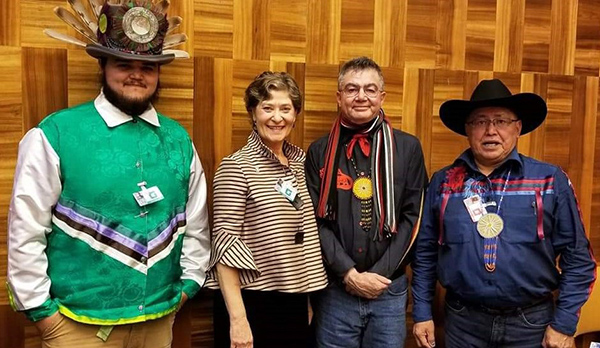
UN Forum on Business and Human Rights, Geneva.
Event co-hosted by the Government of Canada and the Tsilhquotin Nation on 'Achieving Rights for Indigenous Peoples' and attended by Ombud Sheri Myerehoffer as a panel member along with Tsilhquotin Chiefs Francis Laceese and Otis Guichon.
November 26, 2019
We collaborate with others to deliver our mission.
Key stakeholder groups:
Public
Public stakeholders include governments, government institutions and bodies both domestic and foreign.
Private
Private includes Canadian companies, sector associations, business associations, and professional associations in the garment, mining and oil and gas sectors, and their contractors and subcontractors.
Plural
Plural includes civil society organizations and academics.
How we work
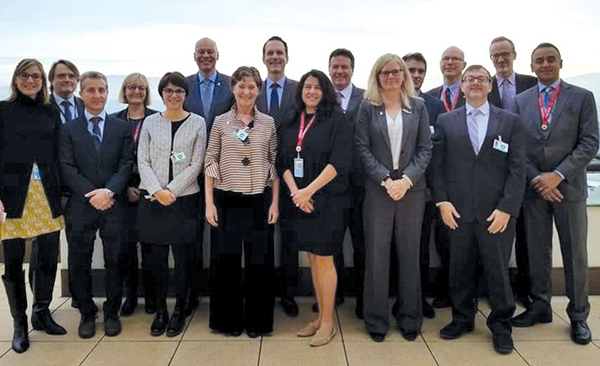 UN Forum on Business and Human Rights, Geneva. Ombud Sheri Meyerhoffer with country representatives and members of the UN Working Group on Business and Human Rights.
UN Forum on Business and Human Rights, Geneva. Ombud Sheri Meyerhoffer with country representatives and members of the UN Working Group on Business and Human Rights.Monday, November 25, 2019
 Ombud Sheri Meyerhoffer speaking to the International Business Class at St. Paul High School, Ottawa to raise awareness of CORE.
Ombud Sheri Meyerhoffer speaking to the International Business Class at St. Paul High School, Ottawa to raise awareness of CORE.October 9, 2019
Our mandate includes the power to review possible human rights abuses arising from Canadian companies operating abroad in the garment, mining, or oil and gas sectors, including their contractors or subcontractors. As such, Canadian companies are responsible to ensure that the human rights of workers and the communities in which they operate are respected throughout their supply chain.
The Ombud reports directly to the Minister of International Trade and provides recommendations on policy through our research and analysis of international legislation and our own work.
We can also recommend to the Minister that a matter be referred to law enforcement if we have reason to believe a criminal offence has or is being committed.
It is imperative to note that while we are a federal government body, the CORE acts at arms-length from Global Affairs Canada and other organizations of the federal government.
We may also collaborate with the Canadian National Contact Point (NCP). The roles of the NCP and the Ombudsperson are complementary. Both the CORE and the NCP can handle complaints about possible human rights abuses by Canadian companies in the garment, mining, and oil and gas sectors. The NCP has a mandate of dialogue facilitation or mediation for all sectors for a wide range of issues, and the CORE may refer cases to the NCP where appropriate. We may also collaborate on best practices related to the advancement of RBC through the promotion of the OECD Guidelines.
 Memorandum of Understanding signing between the Canadian Human Rights Commission and the CORE to support the work of the two organizations to protect and promote human rights at home and abroad, in Ottawa, ON.
Memorandum of Understanding signing between the Canadian Human Rights Commission and the CORE to support the work of the two organizations to protect and promote human rights at home and abroad, in Ottawa, ON.(L-R) Chief Commissioner of the Canadian Human Rights Commission, Marie-Claude Landry and Ombud Sheri Meyerhoffer.
December 12, 2019
We Can
- Carry out dispute resolution and compliance processes that are predictable, flexible, fair, and transparent
- Consider power differences and provide support and resources for vulnerable and marginalized people and communities
- Offer informal mediation services even if no complaint is filed
- Connect a complainant with another office or organization to help if we cannot, when possible
- Launch systemic Ombud-initiated reviews
- Follow-up and report publicly whether the Ombud's recommendations and settlements are implemented
- Offer services in languages other than English and French
- Influence the policies of the Government of Canada and the RBC of Canadian companies through recommendations and public reporting
The Ombud's authority rests on decades of experience in law, the extractive sector, and international human rights.
Promote and advise
The CORE's mandate is set out by an Order in Council on April 8th, 2019. The four-part mandate "promote, advise, review, and recommend" reflects Canada's commitment to RBC and human rights.
The CORE promotes the UNGP (.pdf) and the Organization for Economic Cooperation and Development (OECD) Guidelines for Multinational Enterprises (.pdf), with a specific focus on respect for human rights in the garment, mining, and oil and gas sectors.
We research, analyse, and publish policy briefs to inform Canadian companies operating abroad on best practices to strengthen their respect for human rights. The HRRM supports the influence of RBC by companies operating overseas through its ability to review concerns and make recommendations to provide resolutions.
At the outset of the CORE, public consultations were initiated with a diverse range of key stakeholders. This listening tour allowed invested and impacted groups to make their issues and concerns known and to provide insight into the application of the CORE's mandate, development of key priority areas and our operational procedures.
 World Ethical Apparel Roundtable (WEAR) Conference in Toronto to raise awareness of the CORE with the garment sector.
World Ethical Apparel Roundtable (WEAR) Conference in Toronto to raise awareness of the CORE with the garment sector.October 7, 2019
The listening tour involved consultations with 233 identified key stakeholders across Canada and the world. These included public stakeholders such as government institutions and elected officials, private stakeholders such as industry representatives, and plural stakeholders such as communities and civil society organizations, including Indigenous and Gender Equality and Women's Issues experts and organizations.
Responsible business conduct (RBC) means an environmentally and socially aware business process, from the sourcing of raw materials to manufacturing and shipping.
It also means demonstrating respect for human rights and being consistent with applicable laws and internationally recognized standards.
Who we spoke to:
233 key stakeholders
Public
- 25 Agencies & Independent Bodies
- 8 Elected Officials
- 41 Government Domestic
- 24 Multilateral and foreign bodies
Plural
- 34 Civil Society Organizations
- 2 Indigenous Experts (International)
- 4 Indigenous Experts (Domestic)
- 5 Multi-stakeholder Groups
- 1 Media Outlet
- 27 Universities and Academics
Private
- 26 Sector Companies
- 18 Industry Associations
Highlights and outcomes:
- Development of resources in multiple languages (English, French and Spanish)
- Development of retaliation framework to address potential risks and harms that could emerge
- Development of COVID-19 statement and guidance documents
- Analysis of current Canadian policies and international developments to achieve transformative action
- The release of a policy statement on racial equity
- The creation of communications documents such as Fact Sheets and FAQs
- Established focus areas of:
- Compliance and dispute resolution mechanism: Importance of processes that are accessible, timely, fair, transparent, and impartial.
- Engagement: Importance of transparent, trusting, respectful relationships with stakeholders to establish the CORE as an independent, impartial, and authoritative Ombud.
- Policy and research: Importance of achieving transformative action through evidence-informed and rights-based recommendations and promotion of best practices.
- Organizational effectiveness: Importance of the CORE's unique position and our commitment to increase our status as an independent, effective, respected organization.
Review
The complaint process is the foundation of the CORE's Human Rights Responsibility Mechanism (HRRM) and central to the CORE's commitment to accessible processes. The complaint process is intended to empower people and communities to contact the CORE to raise issues and concerns about possible human rights abuses. Our new, online, easy to use form is the cornerstone of the HRRM. It was created from the ground-up by our office with help from Global Affairs Canada including review for consistency with user design principles. You can also leave a voice mail to file a complaint and we will call you back. Our voice mail system is set up based on user design principles - and we have on-demand access to interpretation services in over 200 languages.
Complaints can be made about possible harm to human rights by a Canadian company operating overseas in the garment, mining, and oil and gas industries that has occurred since the CORE was appointed or if the events complained about happened before that date, they are ongoing. Complaints may be made anonymously to allow anyone to voice their concern.
Complaint admissibility criteria: The complaint must meet the following three criteria in order for the CORE to deal with it:
- Is about an internationally recognized human right; and,
- comes from the operations of a Canadian company working outside of Canada in the garment, mining, or oil and gas sectors; and,
- took place either after May 1, 2019, OR if it began before May 1, 2019, it is still occurring.
Public consultations: What we heard
We launched public consultations with our key stakeholders to get specific feedback on our Operating
Procedures, our retaliation framework, and the criteria to guide the decision to launch an Ombud-initiated review.
Who we spoke to:
- 48 key stakeholder groups
- 15 Public
- 16 Private
- 17 Plural
Highlights/outcomes
- Access to complaint intake services in language of choice.
- Developed a plain-language guide for complainants to assist them through the complaint process, and, a plain language OP. Additionally, all public facing documents were reviewed by plain language editors in three languages: English, French, and Spanish.
- In the process of developing a list of free support services for HRRM participants, such as pro-bono legal advice and retaliation support.
- Our commitment to accessible dispute resolution processes where everyone – regardless of race, gender, ethnicity, language, age, disability, or any combination of characteristics – can participate, exercise their rights, and be heard.
Ombud-initiated review
Additionally, the Ombud may choose to initiate a review of a possible human rights abuse. This is called an "Ombud-initiated review". As part of the CORE's commitment to predictable and transparent processes, the CORE established five criteria to guide the Ombud in deciding whether to initiate a review. The 5 criteria were developed after consultation with domestic and international Ombud offices, human rights bodies, NGOs, and publicly available information on conducting own-initiated inquiries. Key stakeholders were engaged to provide feedback on these criteria.
5 criteria:
- Systemic
It appears to impact a large number of people, in a particularly severe way, across a number of regions or countries, and/or represents a persistent or long-standing issue within one or more of the garment, mining and oil and gas sectors. - Underserved
Those affected may be particularly disenfranchised and/or marginalized. This could mean that there is a disproportionate impact on those affected by the possible human rights abuse or that the individual(s) face particular challenges in claiming their rights. - Feasibility
It is appropriate for a public and participatory review process and the relevant information, expertise, and resources needed to review the issue in sufficient depth to enable a meaningful process are likely to be available. - Impact
Likely to result in meaningful and relevant findings, remedies, and/or recommendations, as appropriate, towards strengthening respect for human rights by Canadian companies operating abroad in the garment, mining, and/or oil and gas sectors. - Strategic Relevance
A review of the possible human rights abuse aligns with the CORE's mandate and strategic priorities.
File a complaint
Anyone with internet or data access can file a complaint using the online form at core-ombuds.canada.ca.
The online form was designed to be compatible with flip phones in cases where internet access is unavailable. Additional methods to file a complaint are available through:
Email: complaints-plaintes@CORE- OCRE.gc.ca
Tel: +1 343 203 5060
Canadian Ombudsperson for Responsible Enterprise
125 Sussex Drive, Ottawa, ON
Canada K1A 0G2
Retaliation
Retaliation for filing or inquiring about a potential human rights abuse is a potential risk and something we take very seriously. Retaliation is any action or treatment that harms a person because they have done any of the following:
- Contacted the CORE
- Filed a complaint with the CORE
- Helped someone else file a complaint with the CORE
- Taken part in the complaint process
- Acted as a witness or provided information about a possible human rights abuse
We can't protect people against retaliation. We work with others to reduce the risk of retaliation. To prevent and mitigate the chance of retaliation, the CORE has developed guiding documents for both companies and individuals and communities so that they understand what retaliation is and what the CORE is doing about it.
How we approach retaliation
1. We assess the risk of retaliation
Before we decide to work with a complaint, or as soon as a complainant contacts us, we look at the situation to assess the risk of retaliation.
2. We reduce the risk of retaliation
We work with the complainant and their community to devise ways to reduce the risk by trying to find safe ways to deal with staying in contact, travelling, and getting information. We will also work to find ways to protect witnesses, interpreters, and others. We will keep in mind additional sets of characteristics that may raise the risk of retaliation: gender, age, race, ethnicity, sexuality, disability, where you live and where you work.
Additionally, all complaints may be filed anonymously, and we will keep the complainant advised of all processes and will not engage in any activity without the consent of the complainant.
3. We respond to retaliation
If we learn that retaliation has happened, we will work to put the right measures in place including involving additional human rights groups: Canadian diplomatic offices abroad, multilateral organizations, regional or national human rights bodies, local organizations, public rights organizations.
4. We report retaliation
We can report on retaliation publicly, on our website and social channels, and can recommend that the Minister of International Trade refers the matter to police. We can also recommend that the Minister takes trade measures against the responsible company.
Public reporting and recommendations
The CORE is uniquely positioned to create real change. We are equipped with powerful tools that can have a significant impact on creating systemic change by affecting the compliance and cooperation of Canadian companies operating overseas.
These tools include:
- to report publicly
- to recommend better business conduct to Canadian companies
- to recommend policy changes to prevent further harm
- to recommend remedies for impacted individuals and communities so that they are made whole
- to recommend trade measures to the Minister
 PDAC 2020 Conference event, Toronto, ON.
PDAC 2020 Conference event, Toronto, ON.Ombud Sheri Meyerhoffer speaking at the Canadian Council for the Americas (CCA) reception at the Toronto Stock Exchange.
March 1, 2020
In September of 2019, we successfully recommended to the Minister an amendment to our OiC to make it clear that the definition of a Canadian company includes the entities it controls
This provides us with the ability to consider the actions of entities that are part of a Canadian company's supply chain and hold the Canadian company accountable for those actions.
Canadian company means an entity that is incorporated or formed by or under an Act of Parliament or of the legislature of a province, or that is otherwise formed in Canada, that operates abroad in the garment, mining, or oil and gas sectors, and includes an entity that it controls and that operates abroad in the garment, mining, or oil and gas sectors.
A Canadian company controls an entity if it controls that entity, directly or indirectly, in any manner; and, a Canadian company that controls an entity is deemed to control any entity that is controlled, or deemed to be controlled, by the entity.
How do we make a difference?
We publish information about human rights on our website, including the following:
- research and analysis on how human rights abuse affects different sectors, regions, and communities
- information on the steps that companies can take to respect human rights
- reports about the human rights abuses we investigate
We report publicly on what we find.
We follow up to see if the harm has been addressed.
If we decide that a Canadian company did not respect human rights in its operations, we recommend ways for the company to address the harm. We do this in several ways:
- Pay to compensate people who are harmed by a human rights abuse
- Apologize publicly for NOT respecting the human rights of the people who have been harmed
- Do what is needed to fix the harm including paying wages, giving back land, and cleaning up pollution
- Make changes so that the same harm or similar harm does NOT happen again, such as pay fair wages and make a workplace safe
We may recommend that the Canadian government take these actions:
- Stop trade support to the Canadian company
- Refuse to give trade or financial support to the company in the future
- Send the complaint to another organization or to the police
- Change Canadian laws and policies
Research and policy are another important function of the CORE. To further support effective and transformative action, we collect statistics about the work we are doing and who we are working with. We collect information on the following:
- The types of human rights abuse we work with
- The sector and region where they take place
- The race, ethnicity, gender, and other characteristics of complainants involved in the dispute resolution process
To do the following:
- Recognize trends that relate to our work
- Identify barriers to taking part in the dispute resolution process
- Understand how to improve our process
- Make recommendations to the Minister to strengthen our work
Information collected may be shared publicly, online and in our annual report and in such a way that the confidentiality of the participants is respected, unless they give their informed consent.
Looking forward
Continuing to work to influence respect for human rights in business.
We have a bold vision and mission. Being the first ombud office with this ambitious mandate highlights the importance of collaboration, adequate resources, and a process of continuous improvement, as integral to the success of the office.
We continue to engage our key stakeholders and those we serve to ensure that our processes are effective and deliver on our mandate.
We have lobbied for additional yearly funding to support the organizational resources that are key to the implementation of the mandate. Our complaints portal is active and taking complaints. What we learn from our complaint data will inform how we can better reach impacted individuals and communities.
In the last half of 2021, we will launch the first Ombud-initiated study – a decision taken based on the eligibility criteria that we carefully crafted and consulted on. As well, we are building a robust performance measurement framework to report on
whether we are achieving our objectives and progress towards our goals.
We have a real opportunity to do what no office before has done, and we are passionate about achieving success.
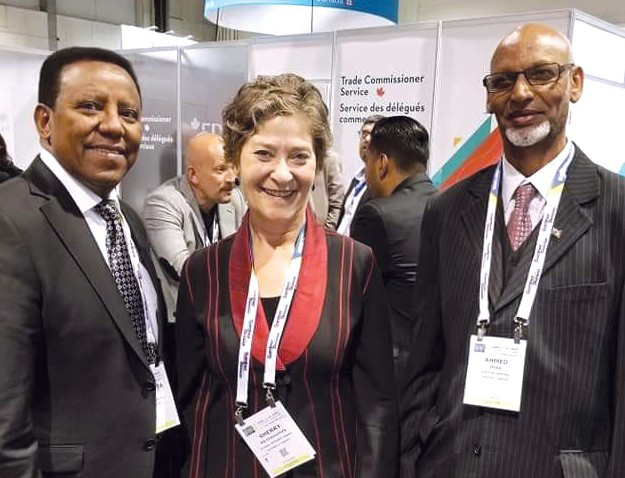
Global Petroleum Show, Calgary, AB.
(L-R) Mulugheta Kusman, Canada's Hon. Consul in Eritrea, Ombud Sheri Meyerhoffer, and Ahmed Iman, State of Eritrea, Toronto.
June 11, 2019
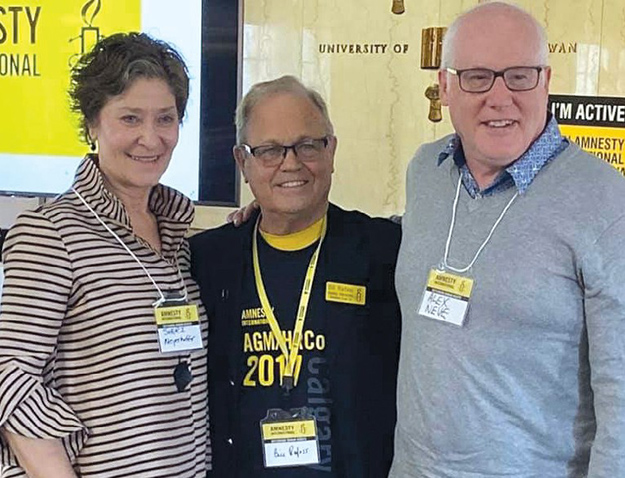
Amnesty International Regional Forum on Human Rights and Corporate Accountability, Saskatoon, SK.
(L-R) Ombud Sheri Meyerhoffer, Bill Raffos and Alex Neve
November 2, 2019
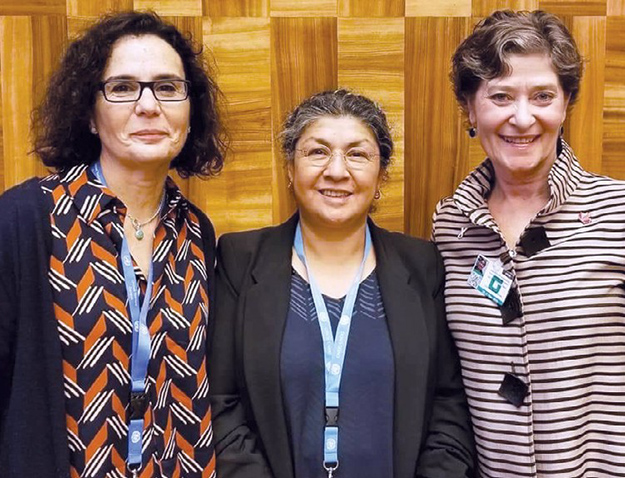
UN Forum on Business and Human Rights, Geneva, CH.
(L-R) Colleague representing the Mapuche People in Chile and Argentina, Ambassadora Apo Weken, Ombud Sheri Meyerhoffer,
November 26, 2019
Expenditures
Office operations
The CORE employed 6 permanent staff, 1 term staff, 3 secondments from the Canadian Human Rights Commission, 1 secondment from the Department of Justice, and two students.
Office infrastructure support services such as procurement, staffing and information technology, were provided by Global Affairs Canada.
Financials
The CORE has an annual operating budget of $1 Million.
Global Affairs Canada provided additional funding of
$1.1 Million to cover start-up costs.
While outside of the reporting period, we note that the 2021 Federal Budget (p. 295) announced additional ongoing funding, increasing the CORE's annual budget to $4.3 Million.
Financials
| Actuals | |
|---|---|
| Salaries | $1,143,422 |
| Travel | $55 |
| Information Services | $71,431 |
| Professional & Special Services | $781,927 |
| Hospitality | – |
| Training | $22,401 |
| Conferences | $2,480 |
| Materials & Supplies | $3,208 |
| Machinery, Equipment & Tools | $9,976 |
| Other Expenditures | $24,320 |
| Capital Expenditures | – |
| TOTAL | $2,059,220 |
Learn more...
To learn more about these public consultations and what we heard, please visit core-ombuds.canada.ca.
Report a problem on this page
- Date modified: